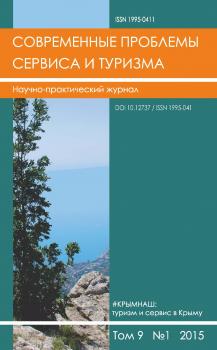The article is devoted to the evaluation of the touristic potential of the territory through experience of Venyovsky district of Tula region. Districts of Tula region, with their unique touristic resources, attractive atmosphere, favorable location and certain advantages over the other areas, where developing tourism, are able to attract not only the large tourist flow from other regions of Russia and foreign countries, but also investors, who are ready to invest in tourism industry. One of the most interesting areas of Tula region as an object of the tourism development is Venyovsky district. Analyzing the component of territory that generates touristic flow, the methods of evaluation based on positional-digit ranking of tourism resources were used. It is shown that the number of tourism resources of the district can generate larger tourist flow in case of development of implementing and localizing area component. Also, the perspective objects, which are not currently used in tourism, were found. SWOT-analysis showed that the maximum realization of potential of Venyovsky district is possible in case of using strengths and partly disregarding threats. To integrate the results of the analysis of strategic factors a special form ofEFAS «Summary of external strategic factors analysis» was used. Also, the analysis of the competitive environment of touristic objects of Venyovsky district was carried out and the preferences of tourists were studied in this work. The research showed that for the development of tourism in the district at the moment the most rational way is to pay attention to the «strategy of concentrated growth», thereby strengthening position of the Venyovsky district in the market.
development of regional tourism, the methods of evaluation of touristic potential of territory, tourism activity, touristic potential, Venyovsky district, Tula region.
Венёвский район расположен в северо-восточной части Тульской области и граничит с Московской областью на севере и востоке. Расположение всего в 150 км от МКАД делает его привлекательным для жителей столичного региона. Район обладает развитой транспортной сетью: по территории проходят три автомобильные трассы федерального значения - Мб «Каспий», М4 «Дон» и КТМР «Калуга -Тула -Михайлов - Рязань», а также Московская железная дорога. Так же туристы используют трассу М2 «Крым» для того, чтобы посетить район вкупе с другими туристическими городами области (Одоев, Белев, Епифань, Крапивна). Туризм в Венёвском районе является развивающейся отраслью. По итогам 2014 г. только центр района - г. Венёв - посетило 7000 чел., в то время как в 2013 г. их число составляло всего 4000 туристов. В районе функционирует два музея -Историко-краеведческий (4505 единиц хранения, среди которых предметы живописи, графики, археологии, нумизматики, этнографии, изделия прикладного искусства), и Музей железнодорожной техники (историко-культурный комплекс на станции Венёв с уникальными экспонатами). Одно из самых популярных и знаменитых мест среди туристов - Святой источник «Двенадцать ключей», вода которого считается целебной.
1. Barabanova N. A. Soderzhanie ponyatiya «informatsionnoe soprovozhdenie turistskoy deyatel´nosti»//Turizm i rekreatsiya: fundamental´nye i prikladnye issledovaniya: Trudy III Mezhdu-nar. nauch. - praktich. konferentsii MGU im. Lomonosova. M.: MGU im. M. V.Lomonosova, 2008. S. 232-237.
2. Vedenin Yu. A. Mifologiya turistskikh resursov i evolyutsiya predstavleniy o resursnom potentsiale territoriy. Izvestiya RAN. Seriya geograficheskaya. 1998. № 4. S. 88-89.
3. Groys B. Gorod v epokhu ego turisticheskoy vosproizvodimosti. Neprikosnovennyy zapas. 2003. №4(30). URL: http://magazines.russ.rU/nz/2003/4/grois.html (Data obrashcheniya: 10.04.2015).
4. Drozdov A. V. Rekreatsionnaya geografiya: idei, metody, praktika. Tver´, 2006.126 s.
5. Kolbovskiy E. Strategicheskoe prostranstvennoe planirovanie kak instrument regional´nogo razvitiya. Yaroslavskiy pedagogicheskiy vestnik. 2011. T. 3. № 3. S. 110-115.
6. Krogius V. R. Istoricheskie goroda Rossii kak fenomen ee kul´turnogo naslediya. M.: Progress-Traditsiya, 2009. 321 s.
7. Lyudvig L. P. Razvitie regional´nogo turizma na osnove strategii upravleniya turistskimi resursami: Dissertatsiya... kand.ekon.nauk. Irkutsk, 2006.168 s.
8. Ponomareva I. Yu., MalafiyA. S. Ispol´zovanie istoriko-kul´turnogo naslediya Tul´skogo kraya v programmakh razvitiya regional´nogo turizma. Izvestiya Tul´skogo gosudarstvennogo universiteta. Gumanitarnye nauki. 2011. № 2. S. 218-222.
9. Ponomareva M. V., Ponomareva I. Yu., Tankieva T. A. Metodika integral´noy otsenki turisticheskoy privlekatel´nosti munitsipal´nykh obrazovaniy Tul´skoy oblasti. Izvestiya TulGU. Ekonomicheskie i yuridicheskie nauki. 2014. Vyp. 5. Ch. I. S. 458-463.
10. Ponomareva I. Yu. i dr. Razvitie vnutrennego i v´´ezdnogo turizma v Tul´skoy oblasti: monografiya. Tula: Izd-vo TulGU, 2011. 209 s.
11. Rubtsov V. A. Prirodno-resursnyy potentsial territoriy i geoinformatsionnye tekhnologii//Ekologicheskiy konsalting (prirodnye resursy, territorial´noe razvitie). 2012. № 3(47). S. 22-29.
12. Tankieva T. A., Ponomareva I. Yu., Ponomareva M. V. Metodika pozitsionno-rangovoy otsenki turisticheskoy privlekatel´nosti territoriy. Izvestiya TulGU. Ekonomicheskie i yuridicheskie nauki. 2014. Vyp. 5. Ch. I. S. 174-180.
13. Turisticheskiy biznes - osnovy organizatsii: monografiya / I. I. Butko i dr. Rostov n/D, 2007. 384 s.
14. Faybusovich E. L. K voprosu o metodike otsenki regional´nogo rekreatsionno-turistskogo potentsiala. «Turizm i rekreatsiya: fundamental´nye i prikladnye issledovaniya»: trudy mezh-dunar. praktich. konf. M., 2006.
15. Khuden´kikh Yu. A. Podkhody k otsenke turistskogo potentsiala territorii na primere rayonov Permskogo kraya. Geografiya i turizm: Sb. nauch. tr. Perm´: Perm. un-t, 2006. Vyp. 2. S. 217-230.
16. Yakunin V. N. Vidy turizma: istoriografiya voprosa. Karel´skiy nauchnyy zhurnal. 2014. № 2. S. 78-83.
17. Ashworth G.J., PageS.J. Urban tourism research: Recent progress and current paradoxes//Tourism Management. 2011. № 32 P. 1-15.





